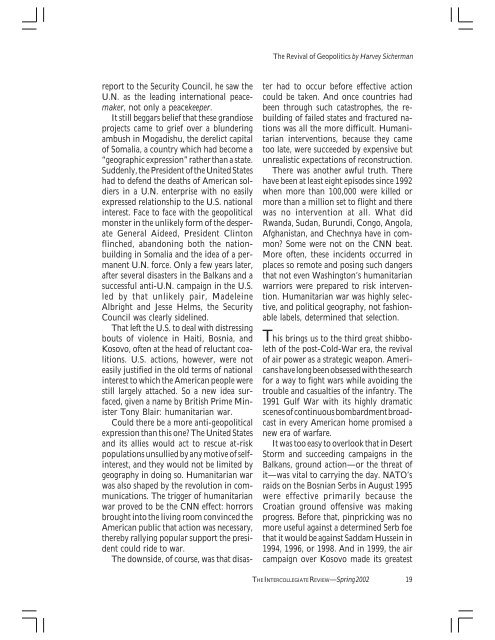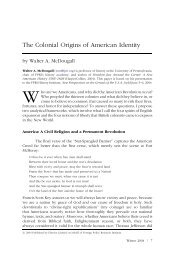The Revival of Geopolitics - Foreign Policy Research Institute
The Revival of Geopolitics - Foreign Policy Research Institute
The Revival of Geopolitics - Foreign Policy Research Institute
You also want an ePaper? Increase the reach of your titles
YUMPU automatically turns print PDFs into web optimized ePapers that Google loves.
eport to the Security Council, he saw the<br />
U.N. as the leading international peacemaker,<br />
not only a peacekeeper.<br />
It still beggars belief that these grandiose<br />
projects came to grief over a blundering<br />
ambush in Mogadishu, the derelict capital<br />
<strong>of</strong> Somalia, a country which had become a<br />
“geographic expression” rather than a state.<br />
Suddenly, the President <strong>of</strong> the United States<br />
had to defend the deaths <strong>of</strong> American soldiers<br />
in a U.N. enterprise with no easily<br />
expressed relationship to the U.S. national<br />
interest. Face to face with the geopolitical<br />
monster in the unlikely form <strong>of</strong> the desperate<br />
General Aideed, President Clinton<br />
flinched, abandoning both the nationbuilding<br />
in Somalia and the idea <strong>of</strong> a permanent<br />
U.N. force. Only a few years later,<br />
after several disasters in the Balkans and a<br />
successful anti-U.N. campaign in the U.S.<br />
led by that unlikely pair, Madeleine<br />
Albright and Jesse Helms, the Security<br />
Council was clearly sidelined.<br />
That left the U.S. to deal with distressing<br />
bouts <strong>of</strong> violence in Haiti, Bosnia, and<br />
Kosovo, <strong>of</strong>ten at the head <strong>of</strong> reluctant coalitions.<br />
U.S. actions, however, were not<br />
easily justified in the old terms <strong>of</strong> national<br />
interest to which the American people were<br />
still largely attached. So a new idea surfaced,<br />
given a name by British Prime Minister<br />
Tony Blair: humanitarian war.<br />
Could there be a more anti-geopolitical<br />
expression than this one? <strong>The</strong> United States<br />
and its allies would act to rescue at-risk<br />
populations unsullied by any motive <strong>of</strong> selfinterest,<br />
and they would not be limited by<br />
geography in doing so. Humanitarian war<br />
was also shaped by the revolution in communications.<br />
<strong>The</strong> trigger <strong>of</strong> humanitarian<br />
war proved to be the CNN effect: horrors<br />
brought into the living room convinced the<br />
American public that action was necessary,<br />
thereby rallying popular support the president<br />
could ride to war.<br />
<strong>The</strong> downside, <strong>of</strong> course, was that disas-<br />
<strong>The</strong> <strong>Revival</strong> <strong>of</strong> <strong>Geopolitics</strong> by Harvey Sicherman<br />
ter had to occur before effective action<br />
could be taken. And once countries had<br />
been through such catastrophes, the rebuilding<br />
<strong>of</strong> failed states and fractured nations<br />
was all the more difficult. Humanitarian<br />
interventions, because they came<br />
too late, were succeeded by expensive but<br />
unrealistic expectations <strong>of</strong> reconstruction.<br />
<strong>The</strong>re was another awful truth. <strong>The</strong>re<br />
have been at least eight episodes since 1992<br />
when more than 100,000 were killed or<br />
more than a million set to flight and there<br />
was no intervention at all. What did<br />
Rwanda, Sudan, Burundi, Congo, Angola,<br />
Afghanistan, and Chechnya have in common?<br />
Some were not on the CNN beat.<br />
More <strong>of</strong>ten, these incidents occurred in<br />
places so remote and posing such dangers<br />
that not even Washington’s humanitarian<br />
warriors were prepared to risk intervention.<br />
Humanitarian war was highly selective,<br />
and political geography, not fashionable<br />
labels, determined that selection.<br />
This brings us to the third great shibboleth<br />
<strong>of</strong> the post-Cold-War era, the revival<br />
<strong>of</strong> air power as a strategic weapon. Americans<br />
have long been obsessed with the search<br />
for a way to fight wars while avoiding the<br />
trouble and casualties <strong>of</strong> the infantry. <strong>The</strong><br />
1991 Gulf War with its highly dramatic<br />
scenes <strong>of</strong> continuous bombardment broadcast<br />
in every American home promised a<br />
new era <strong>of</strong> warfare.<br />
It was too easy to overlook that in Desert<br />
Storm and succeeding campaigns in the<br />
Balkans, ground action—or the threat <strong>of</strong><br />
it—was vital to carrying the day. NATO’s<br />
raids on the Bosnian Serbs in August 1995<br />
were effective primarily because the<br />
Croatian ground <strong>of</strong>fensive was making<br />
progress. Before that, pinpricking was no<br />
more useful against a determined Serb foe<br />
that it would be against Saddam Hussein in<br />
1994, 1996, or 1998. And in 1999, the air<br />
campaign over Kosovo made its greatest<br />
THE INTERCOLLEGIATE REVIEW—Spring 2002 19



